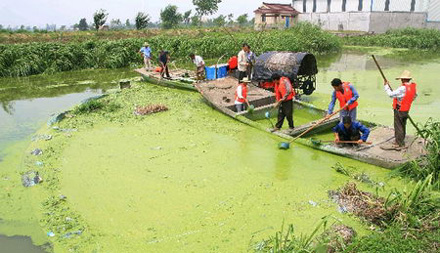On July 3, the State Environmental Protection Administration (SEPA) announced that to safeguard the nation's four major rivers, the Yangtze River, the Yellow River, the Huaihe River and the Haihe River, no new industrial projects would be approved in several cities and industrial parks along their banks.
Anhui has been hard-hit with two cities, Chaohu and Bengbu, along with an industrial park in Wuhu City being banned due to their proximities to the Yangtze and Huaihe rivers.
On the western bank of Chaohu Lake, China's fifth largest freshwater lake, Wang Jiahuai hailing from the nearby Miaowei village near the provincial capital Hefei said on July 6: "When the blue algae appears, it is a spectacular sight. They start off green and then slowly turn black, releasing a foul odor."
"Half a month ago, we were hired by the local government to clear out the blue algae and got paid 50 yuan per day," Wang said. "A few days ago, the government dropped chemicals into the lake to clean up the water, making the algae disappear," he continued.
However, the blue algae still dotted the lake's beaches and invaded the lake again on July 19.
Miaowei village has stood witness to the evolution of pollution in Chaohu Lake. "We have been drinking Chaohu water for 30 years, but we can no longer even wash our clothes in it due to the stink. Now we must dig as far as 30 meters into the earth to get drinking water," said Li, another local villager.
"Almost every household has an underground well," Wang said. "However, affected by the lake, the well water is becoming tainted."
For local residents, the Chaohu Lake not only provided drinking water, but fishing upon it was a major means of making a living.
"Chaohu shrimps are popular on the market and sell at 7 or 8 yuan per 500 grams," a villager surnamed Zhou said. However, with pollution now depleting fish and shrimp stocks, some residents may soon be forced to move to look for work.
Standing on a levee in Wuhu City, on the southern bank of Yangtze River, white pollution belts can be seen arcing across wide swathes of the Yangtze River, extending for long distances.
An economic-technological development area in the city was blacklisted by SEPA on July 3 for its role in polluting the river. Chinese automaker Chery's joint venture with Quantum LLC, a US subsidiary of the Israel Group, is located here and such a ban will hit Chery hard as it seeks to finalize deals with Chrysler and Fiat.
"A lot of sewage water is directly discharged into the Yangtze River," a local resident said.
Anhui's Anqing City, lying further down the Yangtze River is also in trouble with an official at the city's environmental monitoring center revealing: "200,000 tons of domestic sewage water is discharged into the Yangtze River everyday; while an estimated 3600 tons of untreated industrial waste water is also being pumped into the river by the Anqing Petrochemical Company"
Another major river that runs through the province Huaihe has suffered the same fate leaving the residents of Bengbu City in grievous trouble.
"Many people used to stroll along the banks of the Huaihe in the evening, but now it is unbearable," said Wan, a villager from Songtan village. Due to floods and pollution, the whole village has been forced to relocate.
In a worse turn of events, the pollution has begun having effects on the health of villagers including turning young men's hair prematurely grey. Crops are also shuddering to survive with the strong winds bringing ever more pollutants.
Who should be held accountable for the pollution?
In Bengbu, when the SEPA blacklist was announced, three polluting enterprises were immediately instructed to suspend production and four major polluting enterprises saw their senior officials detained, along with four people from the local environmental protection bureau.
However, a local company, FY group (an assumed name) which residents blamed as the prime culprit for polluting the Huaihe River was mysteriously not implicated in SEPA's investigation.
The company extends several thousand meters along the Huaihe River, spreading a cloud of polluting dust.
"The FY group pumps waste water into the river from underground pipes during the night," an environmental protection worker said.
"The floods are coming and will spread the pollutants downriver. Therefore, the water may be clean for a short period but the FY group will be responsible for polluting it again," said an old man surnamed Zhou.
The Bengbu environmental protection bureau refused to comment on the FY Group but local residents were unified in saying that its political connections helped it escape investigation.
"A desire to secure investment and a scramble for higher economic development led by the local government has made all sorts of enterprises set up shop here, including many polluting ones which value profit over environmental safety," an official from Hefei environmental protection bureau concluded. "This is the root cause for Anhui's pollution problem."
All About Blue algae Taihu Lake
(China.org.cn by Yuan Fang September 10, 2007)






